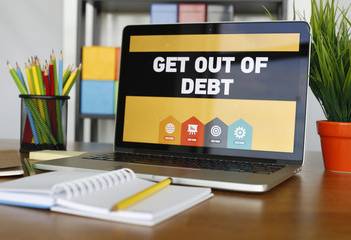Things go bad sometimes, and you may not be able to finance your loan and pay off your debt.
Then you start to think how you can get out of your debt now that you’re broke, you’re on a low income, or at worse, you’ve lost your job.
Debtors often feel hopeless when debts are accumulating while income is on a decline, it is even common for people to get depressed in a worse case, trying to commit suicide.
But there are ways to get out of debt with no money, yes, you heard me.
While some of the steps to take are easy, others can be a little bit complex and difficult to employ.
Tips to getting out of debt effectively
Firstly, there is no easiest way to get out of debt quickly, don’t have this mindset.
Take note of the total debt and your reserves
Make a list of your creditors and the amounts you owe them. Make sure to open all letters that contain invoices or reminders.
Sort the creditors by urgency. If someone has already sent the second or even third reminder, it is high time to pay the bill, otherwise, there is a risk of legal action.
Also, make a note of the amount of any reserves that you can use immediately to pay off your most pressing debts.
Track your expenses
If you want to rid of your debt quickly and easily, you need to set up a plan to change your expensive lifestyle
If you keep track of your expenses in the first place, you will not be able to run into debt easily.
And when you’re already in debt, you need to keep a budget note, track your income and expenditures and reduce your expenses in order to save more cash.
Write down what your monthly fixed costs are, what income you have, and keep track of what you spend money on month after month.
It will always help you throughout the debt settlement process, says Techpally chief editor.
Communicate with your creditors
Do not be ashamed to contact your creditors and explain your difficult situation to them.
Most creditors are interested in dialogue and peaceful solutions. Often, it is when debtors are not interested in paying off debt that banks publish their names in newspapers.
Creditors may want debtors to just contact them and discuss how you’ve been doing your best to pay back the loan.
Many creditors will certainly understand and give you a respite or the opportunity to pay off part of the debt first.
Don’t run into new debts
Stop the growth of your mountain of debt! Now is not the time to make investments that you just can’t afford.
The same goes for loans and borrowing money from friends and family members.
Most importantly, taking out a loan or borrowing money to pay off debts is also the wrong way to go, because that doesn’t solve the problem, it just shifts it.
You have to pay your debts with money that you really have, not money that you have to repay. Otherwise, you face a vicious circle.
Get a side Job
You could start another job, at least for a while. Just a part-time job where it is relatively easy to limit the working days to the weekend.
You can even monetize your skills online, freelance work from home is a great option here.
Liquidate some assets
It is not just a new job that makes you more money. You can also sell things, from small items at the flea market to your own car.
You can also sell some of your stocks – the least yield investment generally.
Review valuable things you have but don’t really use or need again and sell them to get cash.
Debt Consolidation
If you have multiple debt with a bank, there is one way you can have to pay less: you can apply for rescheduling. Your loans are then bundled so that you only have to pay interest once.
You can read more from debt consolidation here.
Personal bankruptcy as a last resort
If all does not work, the mountains of debt keep getting higher and an out-of-court settlement with your creditors is not possible, the last resort is personal bankruptcy.
The bankruptcy court will then rid you of your debts over the course of a multi-year process.
The prerequisite for this, however, is that you are not self-employed, otherwise – like a company – you have to file for bankruptcy.
You will end up with personal bankruptcy, and all remaining debts will be written off and you’ll be debt-free.
Before that, however, your assets will be administered by a trustee and distributed to your creditors for years.
You have to hand over a considerable part of all money that you receive during this time – whether income, inheritances, or gifts – to the trustee, and you are constantly obliged to provide information about your financial life.
